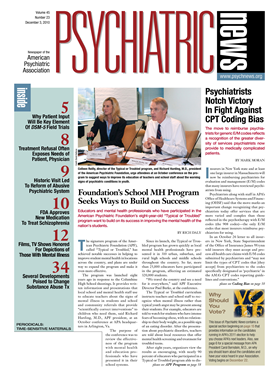One case still haunts psychiatrist Ramaswamy Viswanathan, M.D., D.Sc., a clinical associate professor of psychiatry and division chief of consultation-liaison services at SUNY Downstate Medical Center in Brooklyn, N.Y., years after the encounter with his patient.
A 30-year-old Jehovah's Witness on renal dialysis and with gastrointestinal bleeding refused a blood transfusion because her religion forbade it. After some discussion, Viswanathan persuaded her to accept the transfusion. Once the patient was stabilized, however, the violation of her religious norms distressed her severely. She became depressed enough to require hospitalization. Worse, her decision alienated her family and separated her from her church and the social support it might have provided.
In time, Viswanathan learned a lesson from the experience.
“If I were seeing this patient today, I would accept that religious beliefs are more important than life for some people,” he told listeners at a forum on ethical issues raised when patients refuse treatment. The session was part of the APA Institute on Psychiatric Services in Boston in October.
That case reflected a number of ethical dimensions that physicians frequently face in practice. Culture and decisional capacity as well as religion can play a role in addressing these issues when a patient does not want to be treated.
The bases of ethical care in American medicine are values that sometimes find themselves in conflict: autonomy, beneficence, nonmaleficence, and justice, said another panelist, Ramotse Saunders, M.D., a clinical assistant professor at Downstate Medical Center.
Differences in the strength of those values may vary, especially among non-Western populations, said Saunders.
“There is a lively debate in the biomedical literature arguing that bioethical concerns are universal but that bioethics are a ‘Western’ idea and largely for one group within that tradition,” he said.
Furthermore, even if both doctor and patient nominally come from the same culture, they may have different socioeconomic backgrounds or life experiences and thus may have different views on treatment decisions.
Other nations may legally require doctors to act “in the best interests of the patient,” in effect, mandating beneficence over autonomy. Physicians anywhere may rate beneficence higher than other values because it is their job to diagnose and treat patients, Viswanathan noted.
Sometimes, patients' treatment refusal may reflect not only deeply held religious or cultural beliefs but also uncertainty, fear of the unknown, or unacknowledged anxiety, said Viswanathan. Psychiatrists' therapeutic skills can help open a patient to the need for certain treatments when others have failed in such an effort.
“Other doctors use rational, ‘engineering’ models to try to persuade a patient to accept treatment,” he said. When that doesn't work, a psychiatrist may be called in to see the patient.
“I recommend letting patients talk over their anxieties,” said Viswanathan. “The psychiatrist begins by validating what the patient feels. That can begin a self-caring process that may relieve many anxieties, resulting in more rational behavior by the patient and more openness to treatment.”
He recounted a case in which a young woman refused a recommended Caesarean section without saying why. After a discussion with a psychiatrist, she revealed that an aunt had undergone this procedure, which resulted in considerable pain, and the patient was afraid the same thing might happen to her. After this discussion, she was able to analyze her own situation more objectively and eventually agreed to the procedure.
In psychiatry, the balance between autonomy and beneficence often arises around involuntary treatment, said panelist Sharath Puttichanda, M.D., a third-year resident at Downstate Medical Center.
At one pole lies the view that the patient (at least when fully competent) is in control of his or her destiny. At the other is the question of deciding when a serious mental disorder deprives the patient of the capacity for treatment decision making or is likely to result in harm to the patient or to others. Somewhere between the two poles lies the border of paternalism.
“The principle of utilitarianism asks whether it is ultimately beneficial to the mentally ill person and to society to deprive a person of autonomy temporarily,” said Puttichanda. Treatment, not mere confinement, is essential, however.
APA's model law on involuntary treatment has five criteria: evidence of serious mental illness, a reasonable prospect that it is treatable, refusal of treatment, decisional incapacity, and the likelihood that harm to self or others could occur.
Yet questions remain about the value of involuntary commitment, aside from the matter of safety, he noted. For example, “How therapeutic is the entire process of forcing treatment on patients?” and “How do any legal repercussions compromise ethical obligations?”
The only certainty is uncertainty, Puttichanda stated. “You do the best you can and document everything.”


